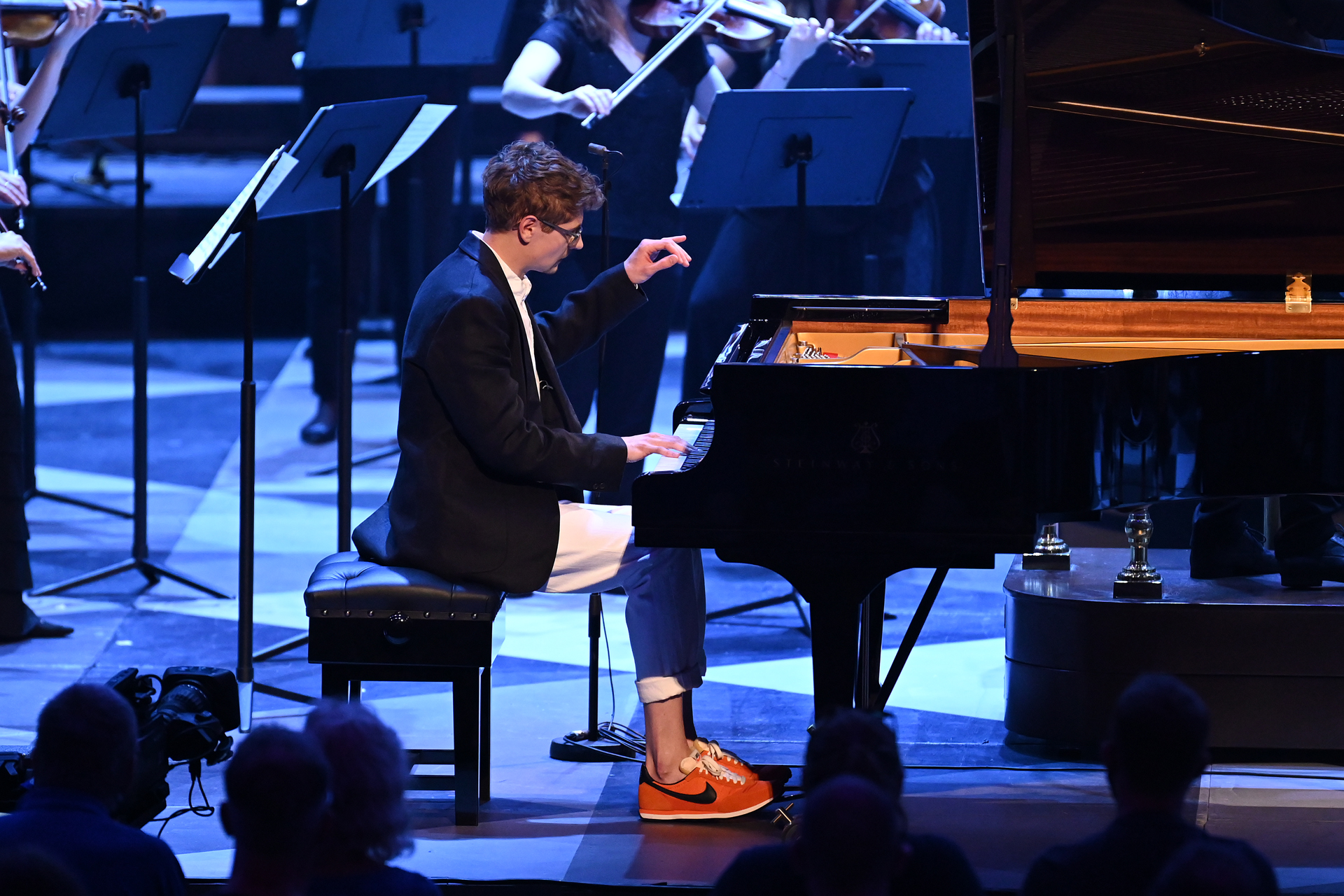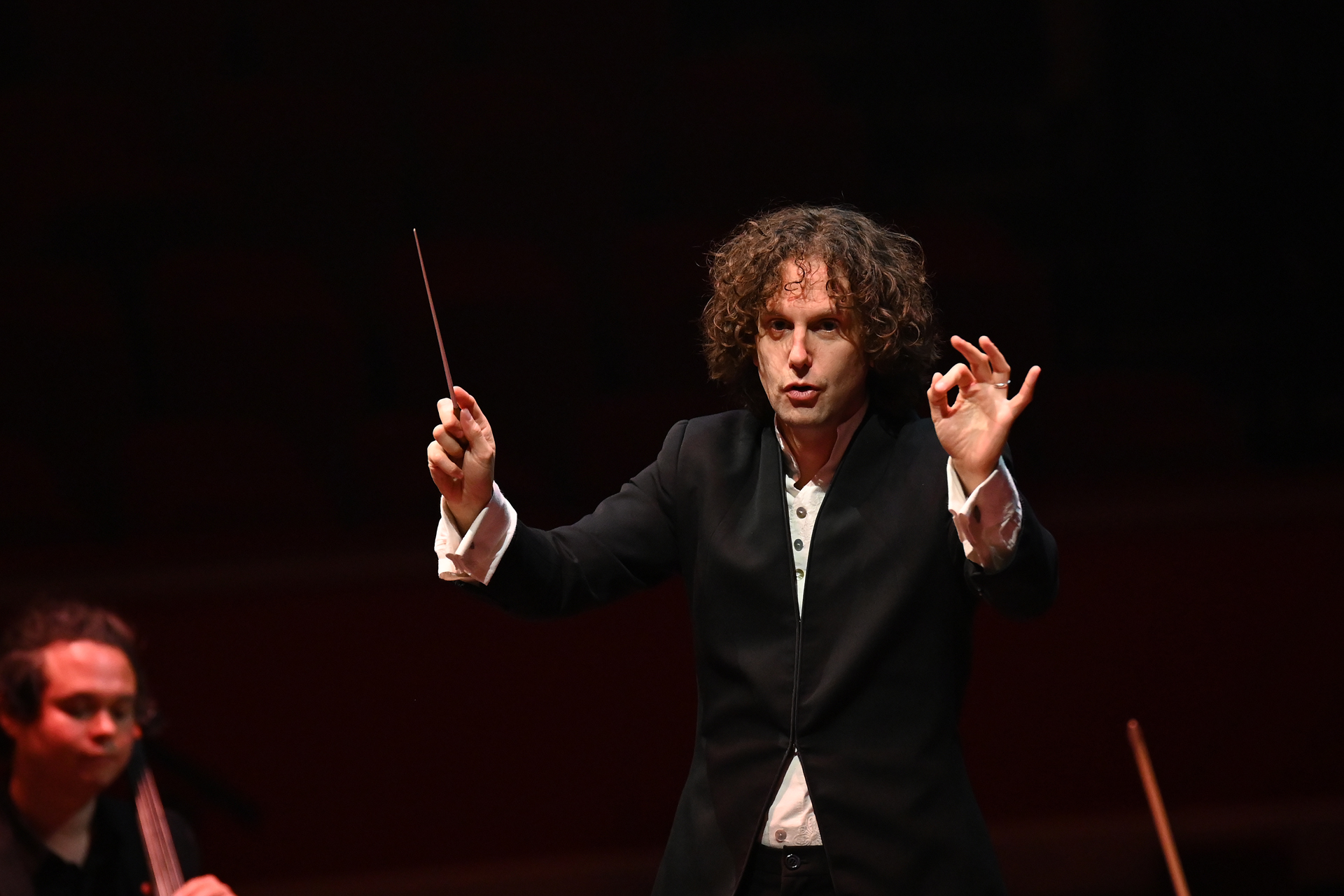Kolesnikov, Aurora Orchestra, Collon, BBC Proms review - dazzling musicianship and insight | reviews, news & interviews
Kolesnikov, Aurora Orchestra, Collon, BBC Proms review - dazzling musicianship and insight
Kolesnikov, Aurora Orchestra, Collon, BBC Proms review - dazzling musicianship and insight
Who knew being back in the classroom could be this much fun?
It’s nobody’s fault, but – try as they might – the BBC Proms can often feel rather middle-aged. Whether it’s the lumbering albatross of a building, the ushers in their dated, casino waistcoats or the tone of zealous jollity (Have fun! But silently and according to the rules!), it somehow all adds up to a lack of freshness, spontaneity. Thank goodness for Aurora Orchestra.
Nicholas Collon’s ensemble has taken a one-off novelty – an orchestral performance from memory – and made it an annual festival fixture. There’s a formula, of course, but thanks to Collon himself and co-presenter Tom Service, it has never yet felt rigid. To teach an audience something without patronising or it feeling like school is the hardest trick to pull off, but thanks to bags of enthusiasm (and the odd viola joke) they reliably leave us all better informed and – better still – fired up to listen more and more carefully. If the BBC are serious about refreshing their arts content they could do a lot worse than deploy Aurora for a series of Bernstein-style programmes. Just think of the impact. 
It was a clever partnership: Kolesnikov witty and urbane, casual through the skittering brilliance of Variation II, playing it cool while the orchestra tried on the composer’s many musical costumes for size, dashing back in as stern, Brahmsian ensemble one minute before returning swathed in Hollywood strings for Variation 18’s slow movement; now an overgrown Palm Court orchestra, now a jazz group.
Best in the Chopin-like fluidity of Variations II and XIX, it was no surprise when Kolesnikov gave us the Raindrop Prelude as an encore, a muted, interior performance that made no concession to the size of the hall, coaxing us in close after the seat-pinning drama of the Rachmaninov. 
Stripped of chairs and music-stands, standing limber and open, the orchestra and Collon threw the music around the stage like it was a ball, now giving us the fancy footwork of the Infernal Dance, now the collective breath of the Round Dance. Through it all, storytelling was uppermost, illuminated in bright detail – whether in the bassoon’s eerie, croaking lullaby, or the eddying softness of the strings, flashes of harp gleaming just beneath. It’s not music that needs explanation, but the benefits were immediate, obvious in the focus, the new intensity of concentration across the audience. If music education in UK schools had only a fraction of this expertise, this energy and commitment, just think of the young musicians we could be creating.
rating
Explore topics
Share this article
Add comment
The future of Arts Journalism
You can stop theartsdesk.com closing!
We urgently need financing to survive. Our fundraising drive has thus far raised £49,000 but we need to reach £100,000 or we will be forced to close. Please contribute here: https://gofund.me/c3f6033d
And if you can forward this information to anyone who might assist, we’d be grateful.

Subscribe to theartsdesk.com
Thank you for continuing to read our work on theartsdesk.com. For unlimited access to every article in its entirety, including our archive of more than 15,000 pieces, we're asking for £5 per month or £40 per year. We feel it's a very good deal, and hope you do too.
To take a subscription now simply click here.
And if you're looking for that extra gift for a friend or family member, why not treat them to a theartsdesk.com gift subscription?
more Classical music
 From Historical to Hip-Hop, Classically Black Music Festival, Kings Place review - a cluster of impressive stars for the future
From quasi-Mozartian elegance to the gritty humour of a kitchen inspection
From Historical to Hip-Hop, Classically Black Music Festival, Kings Place review - a cluster of impressive stars for the future
From quasi-Mozartian elegance to the gritty humour of a kitchen inspection
 Shibe, LSO, Adès, Barbican review - gaudy and glorious new music alongside serene Sibelius
Adès’s passion makes persuasive case for the music he loves, both new and old
Shibe, LSO, Adès, Barbican review - gaudy and glorious new music alongside serene Sibelius
Adès’s passion makes persuasive case for the music he loves, both new and old
 Anja Mittermüller, Richard Fu, Wigmore Hall review - a glorious hall debut
The Austrian mezzo shines - at the age of 22
Anja Mittermüller, Richard Fu, Wigmore Hall review - a glorious hall debut
The Austrian mezzo shines - at the age of 22
 First Person: clarinettist Oliver Pashley on the new horizons of The Hermes Experiment's latest album
Compositions by members of this unusual quartet feature for the first time
First Person: clarinettist Oliver Pashley on the new horizons of The Hermes Experiment's latest album
Compositions by members of this unusual quartet feature for the first time
 Gesualdo Passione, Les Arts Florissants, Amala Dior Company, Barbican review - inspired collaboration excavates the music's humanity
At times it was like watching an anarchic religious procession
Gesualdo Passione, Les Arts Florissants, Amala Dior Company, Barbican review - inspired collaboration excavates the music's humanity
At times it was like watching an anarchic religious procession
 Classical CDs: Camels, concrete and cabaret
An influential American composer's 90th birthday box, plus British piano concertos and a father-and-son duo
Classical CDs: Camels, concrete and cabaret
An influential American composer's 90th birthday box, plus British piano concertos and a father-and-son duo
 Cockerham, Manchester Camerata, Sheen, Martin Harris Centre, Manchester review - re-enacting the dawn of modernism
Two UK premieres added to three miniatures from a seminal event of January 1914
Cockerham, Manchester Camerata, Sheen, Martin Harris Centre, Manchester review - re-enacting the dawn of modernism
Two UK premieres added to three miniatures from a seminal event of January 1914
 Kempf, Brno Philharmonic, Davies, Bridgewater Hall, Manchester review - European tradition meets American jazz
Bouncing Czechs enjoy their Gershwin and Brubeck alongside Janáček and Dvořák
Kempf, Brno Philharmonic, Davies, Bridgewater Hall, Manchester review - European tradition meets American jazz
Bouncing Czechs enjoy their Gershwin and Brubeck alongside Janáček and Dvořák
 Solomon, OAE, Butt, QEH review - daft Biblical whitewashing with great choruses
Even a top soprano and mezzo can’t make this Handel paean wholly convincing
Solomon, OAE, Butt, QEH review - daft Biblical whitewashing with great choruses
Even a top soprano and mezzo can’t make this Handel paean wholly convincing
 Two-Piano Gala, Kings Place review - shining constellations
London Piano Festival curators and illustrious friends entertain and enlighten
Two-Piano Gala, Kings Place review - shining constellations
London Piano Festival curators and illustrious friends entertain and enlighten
 Echo Vocal Ensemble, Latto, Union Chapel review - eclectic choral programme garlanded with dance
Beautiful singing at the heart of an imaginative and stylistically varied concert
Echo Vocal Ensemble, Latto, Union Chapel review - eclectic choral programme garlanded with dance
Beautiful singing at the heart of an imaginative and stylistically varied concert
 Scott, Irish Baroque Orchestra, Whelan, RIAM, Dublin review - towards a Mozart masterpiece
Characteristic joy and enlightenment from this team, but a valveless horn brings problems
Scott, Irish Baroque Orchestra, Whelan, RIAM, Dublin review - towards a Mozart masterpiece
Characteristic joy and enlightenment from this team, but a valveless horn brings problems

Comments
Lovely review. I sympathise